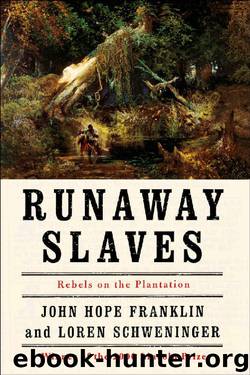Runaway Slaves: Rebels on the Plantation by John Hope Franklin & Loren Schweninger

Author:John Hope Franklin & Loren Schweninger [Franklin, John Hope]
Language: eng
Format: epub
Publisher: Oxford University Press
Published: 2000-07-19T22:00:00+00:00
Managers and Overseers
Overseeing a plantation was at best a difficult undertaking. Managers were asked to be firm, fair, and demanding as well as vigilant, compassionate, and strict. They were told to punish slaves who did not adhere to plantation rules but never to use threats or excessive force. They were expected to go to the fields with the hands; remain there until the end of each day; keep an eye on livestock, farm machinery, and the storehouse; and maintain accurate records of how slaves worked. They should do everything in their power, one slave owner instructed, to protect pregnant women and “sucklers”—every baby was worth several hundred dollars—and in other ways protect “the condition and value of the negroes.” They should be knowledgeable about the plantation and know how and when to plant a crop, correct slaves, appoint drivers, organize a work routine, and produce a good crop. “A good crop means one that is good taking into consideration every thing,” a planter in the Yazoo-Mississippi Delta wrote respecting the management of his estate, “hands, breeding women, children, mules, Stocks, provisions, farming utensils of all Sorts & Keeping up land, ditches, fences.”2
Those who could bring in “a good crop” were in great demand, especially during the decades preceding the Civil War as the plantation system expanded in many regions. “If you have the courage to drive Negroes,” a Demopolis, Alabama, man wrote a friend in North Carolina in 1859, “there are overseers about here no larger man than you are who are getting” as much as one thousand dollars a year. In Alabama, as elsewhere, they were hired almost exclusively by “planters”—those with at least twenty slaves—and even among the planters, those with twenty or twenty-five slaves could sometimes not afford to hire overseers. It was a matter of prestige, however, to have an overseer, and whenever possible, slave owners hired someone to take care of the day-to-day operations.3 The large slaveholders—those with at least fifty in the slave force—relied almost exclusively on managers and/or overseers, men who lived on the plantation, often in small houses near the quarters, and were responsible for maintaining control, order, and discipline “among the negroes.” On the largest estates there was a chain of command, with managers administering overseers, who administered slave drivers, who watched over the slaves.
Among the many problems overseers dealt with—bad weather, insects, disease, theft, low yields, owner dissatisfaction—one of the most vexing and troublesome was runaway slaves. It was a problem that confronted the vast majority of managers, and one that seemed to have no solution. It did not seem to matter whether they cajoled, chastised, or severely punished offenders; whether they threatened to sell, trade, or transfer loved ones; whether they gave cash payments, allowed special privileges, or permitted visits to town. Whatever method they tried, slaves continued to run away, alone or with their families, young and old, men and women. At times they intentionally disrupted the work routine, setting out at the peak of the planting or harvesting season.
Download
This site does not store any files on its server. We only index and link to content provided by other sites. Please contact the content providers to delete copyright contents if any and email us, we'll remove relevant links or contents immediately.
| African-American Studies | Asian American Studies |
| Disabled | Ethnic Studies |
| Hispanic American Studies | LGBT |
| Minority Studies | Native American Studies |
Cecilia; Or, Memoirs of an Heiress — Volume 1 by Fanny Burney(32547)
Cecilia; Or, Memoirs of an Heiress — Volume 2 by Fanny Burney(31945)
Cecilia; Or, Memoirs of an Heiress — Volume 3 by Fanny Burney(31931)
The Great Music City by Andrea Baker(31917)
We're Going to Need More Wine by Gabrielle Union(19034)
All the Missing Girls by Megan Miranda(15958)
Pimp by Iceberg Slim(14488)
Bombshells: Glamour Girls of a Lifetime by Sullivan Steve(14057)
For the Love of Europe by Rick Steves(13912)
Talking to Strangers by Malcolm Gladwell(13349)
Norse Mythology by Gaiman Neil(13348)
Fifty Shades Freed by E L James(13232)
Mindhunter: Inside the FBI's Elite Serial Crime Unit by John E. Douglas & Mark Olshaker(9324)
Crazy Rich Asians by Kevin Kwan(9277)
The Lost Art of Listening by Michael P. Nichols(7494)
Enlightenment Now: The Case for Reason, Science, Humanism, and Progress by Steven Pinker(7306)
The Four Agreements by Don Miguel Ruiz(6744)
Bad Blood by John Carreyrou(6611)
Weapons of Math Destruction by Cathy O'Neil(6265)
